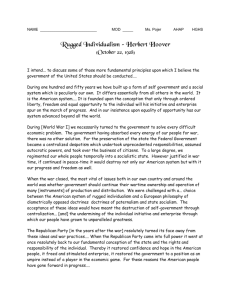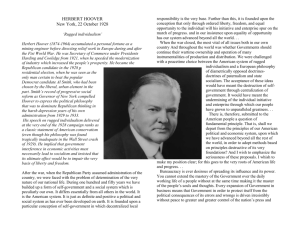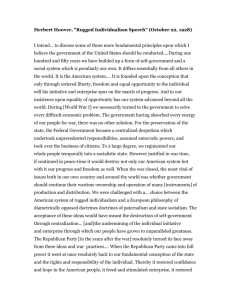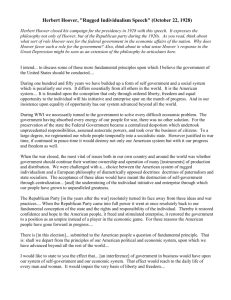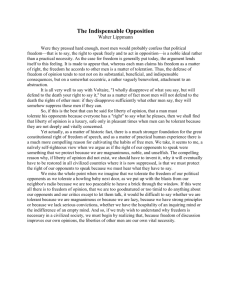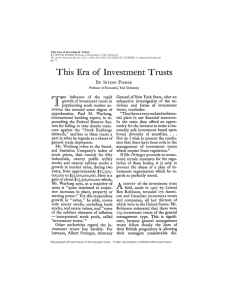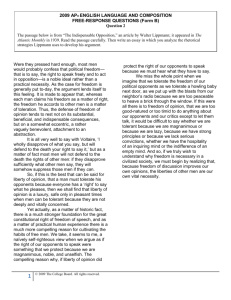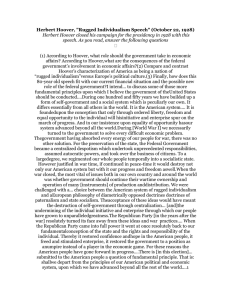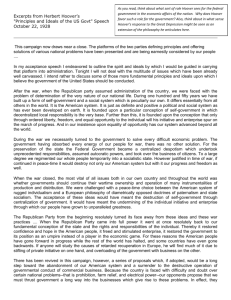Herbert H. Hoover
advertisement
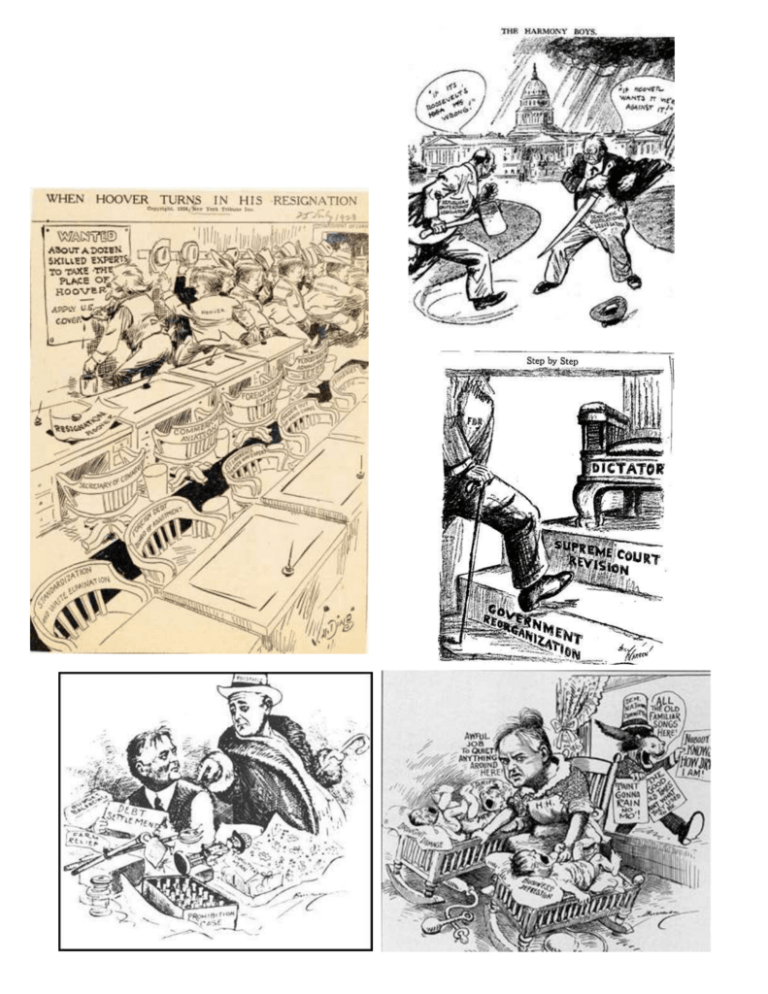
Herbert Hoover, "Rugged Individualism Speech" (October 22, 1928) I intend... to discuss some of those more fundamental principles upon which I believe the government of the United States should be conducted.... During one hundred and fifty years we have builded up a form of self government and a social system which is peculiarly our own. It differs essentially from all others in the world. It is the American system.... It is founded upon the conception that only through ordered liberty, freedom and equal opportunity to the individual will his initiative and enterprise spur on the march of progress. And in our insistence upon equality of opportunity has our system advanced beyond all the world. During [World War I] we necessarily turned to the government to solve every difficult economic problem. The government having absorbed every energy of our people for war, there was no other solution. For the preservation of the state the Federal Government became a centralized despotism which undertook unprecedented responsibilities, assumed autocratic powers, and took over the business of citizens. To a large degree, we regimented our whole people temporally into a socialistic state. However justified in war time, if continued in peace-time it would destroy not only our American system but with it our progress and freedom as well. When the war closed, the most vital of issues both in our own country and around the world was whether government should continue their wartime ownership and operation of many [instruments] of production and distribution. We were challenged with a... choice between the American system of rugged individualism and a European philosophy of diametrically opposed doctrines doctrines of paternalism and state socialism. The acceptance of these ideas would have meant the destruction of selfgovernment through centralization... [and] the undermining of the individual initiative and enterprise through which our people have grown to unparalleled greatness. The Republican Party [in the years after the war] resolutely turned its face away from these ideas and war practices.... When the Republican Party came into full power it went at once resolutely back to our fundamental conception of the state and the rights and responsibility of the individual. Thereby it restored confidence and hope in the American people, it freed and stimulated enterprise, it restored the government to a position as an umpire instead of a player in the economic game. For these reasons the American people have gone forward in progress.... There is [in this election]... submitted to the American people a question of fundamental principle. That is: shall we depart from the principles of our American political and economic system, upon which we have advanced beyond all the rest of the world.... I would like to state to you the effect that... [an interference] of government in business would have upon our system of self-government and our economic system. That effect would reach to the daily life of every man and woman. It would impair the very basis of liberty and freedom.... Let us first see the effect on self-government. When the Federal Government undertakes to go into commercial business it must at once set up the organization and administration of that business, and it immediately finds itself in a labyrinth.... Commercial business requires a concentration of responsibility. Our government to succeed in business would need to become in effect a despotism. There at once begins the destruction of selfgovernment.... It is a false liberalism that interprets itself into the government operation of commercial business. Every step of bureaucratizing of the business of our country poisons the very roots of liberalism that is political equality, free speech, free assembly, free press and equality of opportunity. It is not the road to more liberty, but to less liberty. Liberalism should not be striving to spread bureaucracy but striving to set bounds to it.... Liberalism is a force truly of the spirit, a force proceeding from the deep realization that economic freedom cannot be sacrificed if political freedom is to be preserved. [An expansion of the governmentís role in the business world] would cramp and cripple the mental and spiritual energies of our people. It would extinguish equality and opportunity. It would dry up the spirit of liberty and progress... For a hundred and fifty years liberalism has found its true spirit in the American system, not in the European systems. I do not wish to be misunderstood.... I am defining general policy.... I have already stated that where the government is engaged in public works for purposes of flood control, of navigation, of irrigation, of scientific research or national defense... it will at times necessarily produce power or commodities as a by-product. Nor do I wish to be misinterpreted as believing that the United States is a freefor-all and devil-take-the-hindmost. The very essence of equality of opportunity and of American individualism is that there shall be no domination by any group or [monopoly] in this republic.... It is no system of laissez faire.... I have witnessed not only at home but abroad the many failures of government in business. I have seen its tyrannies, its injustices, its destructions of selfgovernment, its undermining of the very instincts which carry our people forward to progress. I have witnessed the lack of advance, the lowered standards of living, the depressed spirits of people working under such a system.... And what has been the result of the American system? Our country has become the land of opportunity to those born without inheritance, not merely because of the wealth of its resources and industry but because of this freedom of initiative and enterprise. Russia has natural resources equal to ours.... But she has not had the blessings of one hundred and fifty years of our form of government and our social system. By adherence to the principles of decentralized self-government, ordered liberty, equal opportunity, and freedom to the individual, our American experiment in human welfare has yielded a degree of well-being unparalleled in the world. It has come nearer to the abolition of poverty, to the abolition of fear of want, than humanity has ever reached before. Progress of the past seven years is proof of it.... The greatness of America has grown out of a political and social system and a method of [a lack of governmental] control of economic forces distinctly its own our American system which has carried this great experiment in human welfare farther than ever before in history.... And I again repeat that the departure from our American system... will jeopardize the very liberty and freedom of our people, and will destroy equality of opportunity not only to ourselves, but to our children.... Annual Message to Congress Herbert H. Hoover December 8, 1931 … Further Measures The major economic forces and weaknesses at home and abroad have now been exposed and can be appraised, and the time is ripe for forward action to expedite our recovery. Although some of the causes of our depression are due to speculation, inflation of securities and real estate, unsound foreign investments, and mismanagement of financial institutions, yet our self-contained national economy, with its matchless strength and resources, would have enabled us to recover long since but for the continued dislocations, shocks and setbacks from abroad…. The situation largely arises from an unjustified lack of confidence. We have enormous volumes of idle money in the banks and in hoarding. We do not require more money or working capital -- we need to put what we have to work. The fundamental difficulties which have brought about financial strains in foreign countries do not exist in the United States. No external drain on our resources can threaten our position, because the balance of international payments is in our favor; we owe less to foreign countries than they owe to us; our industries are efficiently organized; our currency and bank deposits are protected by the greatest gold reserve in history. Our first step toward recovery is to reestablish confidence and thus restore the flow of credit which is the very basis of our economic life. We must put some steel beams in the foundations of our credit structure. It is our duty to apply the full strength of our government not only to the immediate phases, but to provide security against shocks and the repetition of the weaknesses which have been proven. The recommendations which I here lay before the Congress are designed to met these needs by strengthening financial, industrial, and agricultural life through the medium of our existing institutions, and thus to avoid the entry of the government into competition with private business. … Reconstruction Finance Corporation In order that the public may be absolutely assured and that the government may be in position to meet any public necessity, I recommend that an emergency Reconstruction Corporation of the nature of the former War Finance Corporation should be established. It may not be necessary to use such an instrumentality very extensively. The very existence of such a bulwark will strengthen confidence. The Treasury should be authorized to subscribe a reasonable capital to it, and it should be placed in liquidation at the end of two years. Its purpose is by strengthening the weak spots to thus liberate the full strength of the nation's resources. It should be in position to facilitate exports by American agencies; make advances to agricultural credit agencies where necessary to protect and aid the agricultural industry; to make temporary advances upon proper securities to established industries, railways, and financial institutions which can not otherwise secure credit, and where such advances will protect the credit structure and stimulate employment. Its functions would not overlap whose of the National Credit Corporation. THE CONSEQUENCES OF THE PROPOSED NEW DEAL Madison Square Garden, New York October 21, 1932 This campaign is more than a contest between two men. It is more than a contest between two parties. It is a contest between two philosophies of government… And I realize that in this time of distress many of our people are asking whether our social and economic system is incapable of that great primary function of providing security and comfort of life to all of the firesides of our 25,000,000 homes in America, whether our social system provides for the fundamental development and progress of our people, whether our form of government is capable of originating and sustaining that security and progress…. This question is the basis upon which our opponents are appealing to the people in their fears and distress. They are proposing changes and so-called new deals, which would destroy the very foundations of our American system… Our people should consider the primary facts before they come to the judgment—not merely through political agitation, the glitter of promise, and the discouragement of temporary hardships—whether they will support changes, which radically affect the whole system, which has been builded up by a hundred and fifty years of the toil of the fathers. They should not approach the question in the despair with which our opponents would clothe it… Let us pause for a moment and examine the American system of government, of social and economic life, which it is now proposed that we should alter. Our system is the product of our race and of our experience in building a nation to heights unparalleled in the whole history of the world… It is founded on the conception that only through ordered liberty, through freedom to the individual, and equal opportunity to the individual will his initiative and enterprise be summoned to spur the march of progress… It is founded on a peculiar conception of self-government designed to maintain this equal opportunity to the individual, and through decentralization it brings about and maintains these responsibilities. The centralization of government will undermine responsibilities and will destroy the system… Our Government differs from all previous conceptions, not only in this decentralization, but also in the separation of functions between the legislative, executive, and judicial arms of government… Three years ago there came a break in this progress. A break of the same type we have met fifteen times a century and yet we have overcome them. But eighteen months later came a further blow by shocks transmitted to us by the earthquakes of the collapse in nations throughout the world as the aftermath of the World War. The workings of our system were dislocated. Millions of men and women are out of jobs. Businessmen and farmers suffer. Their distress is bitter. I do not seek to minimize the depth of it… And in order to indicate to you that the proposals of our opponents will endanger or destroy our system, I propose to analyze a few of the proposals of our opponents in the relation to these fundamentals… The extension of Government expenditures beyond the minimum limit necessary to conduct the proper functions of the Government enslaves men to work for the Government. The Federal Government has been forced in this emergency to unusual expenditure, but in partial alleviation of these extraordinary and unusual expenditures the Republican Administration has made a successful effort to reduce the ordinary running expenses of the Government. Our opponents have persistently interfered with such policies. These things (massive Government spending) can and must be resisted. But they can only be resisted if there shall be live and virile public support to the Administration, in opposition to political log-rolling and the sectional and group raids on the Treasury for distribution of public money, which is cardinal in the congeries of elements which make up the Democratic Party. Another proposal of our opponents, which would destroy the American system, is that of inflation of the currency. Another proposal of our opponents, which would wholly alter our American system of life, is to reduce the protective tariff to a competitive tariff for revenue. Recently there was circulated through the unemployed in this country a letter from the Democratic candidate in which he stated that he . . . would support measures for the inauguration of self-liquidating public works such as the utilization of water resources, flood control, land reclamation, to provide employment for all surplus labor at all times. In America today we are nearer a final triumph over poverty than in any land. The poorhouse has vanished from among us; we have not reached that goal, but given a chance to go forward, we shall, with the help of God, be in sight of the day when poverty will be banished from this Nation. My countrymen, the proposals of our opponents represent a profound change in American life—less in concrete proposal, bad as that may be, than by implication and by evasion. Dominantly in their spirit they represent a radical departure from the foundations of 150 years, which have made this the greatest nation in the world. This election is not a mere shift from the ins to the outs. It means deciding the direction our Nation will take over a century to come. My conception of America is a land where men and women may walk in ordered liberty, where they may enjoy the advantages of wealth not concentrated in the hands of a few but diffused through the lives of all, where they build and safeguard their homes, give to their children full opportunities of American life, where every man shall be respected in the faith that his conscience and his heart direct him to follow, where people secure in their liberty shall have leisure and impulse to seek a fuller life. That leads to the release of the energies of men and women, to the wider vision and higher hope; it leads to opportunity for greater and greater service not alone of man to man in our country but from our country to the world. It leads to health in body and a spirit unfettered, youthful, eager with a vision stretching beyond the farthest horizons will an open mind, sympathetic and generous. But that must be builded upon our experience with the past, upon the foundations, which have made our country great. It must be the product of our truly American system.
